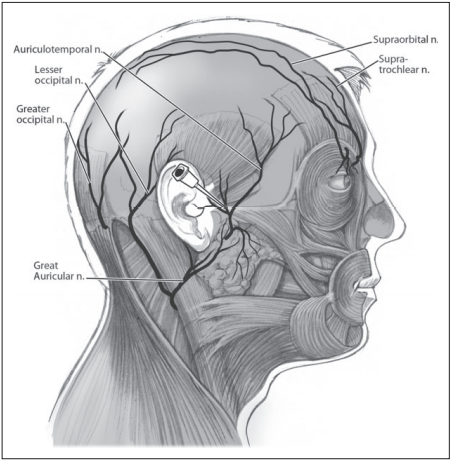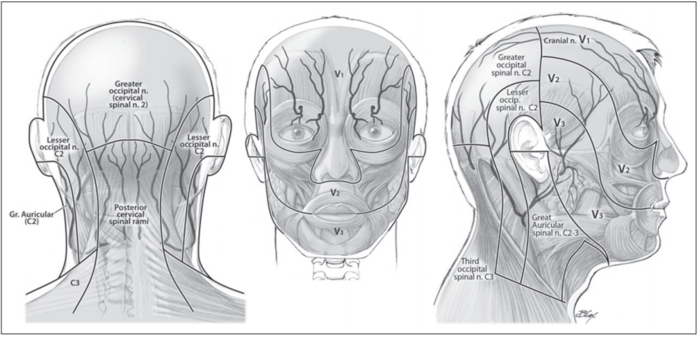◒
Auriculotemporal Nerve Injection: Difference between revisions
From WikiMSK
No edit summary |
No edit summary |
||
| Line 12: | Line 12: | ||
==Anatomy== | ==Anatomy== | ||
The auriculotemporal nerve arises as a posterior division of the mandibular branch of the trigeminal nerve. It innervates the temples and the temporomandibular joint. The superficial branches supply the tragus and the auricle of the ear. Its proximal trunk is located superficially just anterior to the tragus. | The auriculotemporal nerve arises as a posterior division of the mandibular branch of the trigeminal nerve. It innervates the temples and the temporomandibular joint. The superficial branches supply the tragus and the auricle of the ear. Its proximal trunk is located superficially just anterior to the tragus. | ||
The external ear innervated by four sensory nerves: greater auricular nerve, lesser occipital nerve, auricular branch of vagus nerve, and the auriculotemporal nerve. | |||
;Cranio-cervical Dermatomes.<ref>{{#pmid:23406160}}</ref> | ;Cranio-cervical Dermatomes.<ref>{{#pmid:23406160}}</ref> | ||
Revision as of 07:15, 30 March 2021
This article is still missing information.

| |
| Auriculotemporal Nerve Injection | |
|---|---|
| Indication | Headache disorders and laceration repair |
| Syringe | 5mL |
| Needle | 27-30g |
Anatomy
The auriculotemporal nerve arises as a posterior division of the mandibular branch of the trigeminal nerve. It innervates the temples and the temporomandibular joint. The superficial branches supply the tragus and the auricle of the ear. Its proximal trunk is located superficially just anterior to the tragus.
The external ear innervated by four sensory nerves: greater auricular nerve, lesser occipital nerve, auricular branch of vagus nerve, and the auriculotemporal nerve.
- Cranio-cervical Dermatomes.[1]
Technique
Landmark Guided
- Position: patient seated and physician standing beside them, or with the patient supine and their head in a neutral position.
- Injection point is just anterior to the tragus
- Use a 5 mL syringe with a 30-gauge needle
- Insert the needle 1–2 mL into the subcutaneous tissue to a depth of about 4–6 mm.
- Aspirate to exclude arterial puncture and inject
References
Literature Review
- Reviews from the last 7 years: review articles, free review articles, systematic reviews, meta-analyses, NCBI Bookshelf
- Articles from all years: PubMed search, Google Scholar search.
- TRIP Database: clinical publications about evidence-based medicine.
- Other Wikis: Radiopaedia, Wikipedia Search, Wikipedia I Feel Lucky, Orthobullets,



